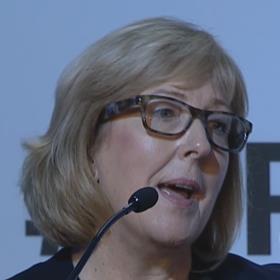By Fiona Reynolds (@Fireynolds), CEO, the PRI

It was with some surprise that I woke up this morning to a news article sharing that the Minerals Council of Australia through Coal 21 was out scouting for an ad agency to develop a campaign to make Australians feel proud about coal. I actually thought it was a joke until I saw that it was from the ABC, Australia’s trusted media source.
As an Australian, no amount of advertising is going to make me feel heart-warming emotions about coal. It doesn’t mean that I don’t recognise that it has played a role in the development of the country, it has. That, however, doesn’t mean that it has a role in our future.
It doesn’t mean I don’t recognise the role coal has played in the development of Australia; that doesn’t mean that it has a role in our future
Coal 21 was established to research carbon, capture and storage (CCS). As we all know, as it currently stands there is no viable CCS. At the same time, the Australian government seems determined that the answer to lowering the country’s emissions is not in renewables but in clean coal technology and in nuclear power (which will never happen in Australia as nobody wants a nuclear power plant near their back yard). This has surprisingly been supported by some investment associations. The last time I was there however, Australia still had an abundance of sun and wind – but these annoying little facts seem to continue to be ignored.
With some countries and companies not playing their role in addressing climate risks, investors have been increasing stepping up to protect their assets with a focus on engaging with the world’s largest emitting companies; some that the Minerals Council and organisations like it represent.
Initiatives like Climate Action 100+ are engaging companies on governance and board strategies around the transition, asking for meaningful emissions reduction targets in line with the Paris Agreement and reporting in line with the TCFD recommendations. In addition, a lot of effort has gone into asking companies about their lobbying efforts and the associations that they are members of – after all, it’s shareholder money that is used to fund these lobbying groups and investors understand only too well that in some cases their money is being used in ways that are not aligned with their long-term interests.
The latest report by TPI outlines how the world’s largest emitting public companies, which are responsible for 41% of emissions, are transitioning to a low-carbon economy. A staggering 46% of companies assessed are failing to adequately integrate climate change into their business decisions; one in eight companies are reducing carbon emissions at the rate required to keep global warming below 2°; a quarter of companies do not report their emissions at all, undermining a key TCFD recommendation; and just one in four companies assessed for a second year are improving on climate management.
These findings highlight that although there has been some progress, there is a lot of work still to be done.
It seems that some organisations would rather divert people’s attention from the true facts about climate change and engage in a public relations smoke screen than get on with the hard task of the transition. It’s also a timely reminder that investors continue to need to engage around political lobbying.
The PRI developed guidance for investors on lobbying: Converging on climate lobbying: aligning corporate practice with investor expectations. It provides an overview of why investors should engage on this topic; suggested questions to ask companies; examples of good and poor corporate practice; and PRI signatory case studies showcasing investor action. We have also undertaken an investor engagement on the topic.
I suggest that all investors avert their eyes from propaganda such as the proposed ad campaign in Australia, dust off their copy and put the guidance into action as part of their climate change strategy. It’s in staying focused and engaged on the realities of climate change that investors around the world can make a real difference.
This blog is written by PRI staff members and guest contributors. Our goal is to contribute to the broader debate around topical issues and to help showcase some of our research and other work that we undertake in support of our signatories.
Please note that although you can expect to find some posts here that broadly accord with the PRI’s official views, the blog authors write in their individual capacity and there is no “house view”. Nor do the views and opinions expressed on this blog constitute financial or other professional advice.
If you have any questions, please contact us at [email protected].








